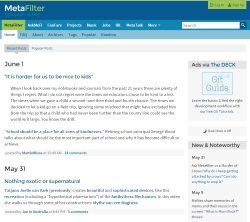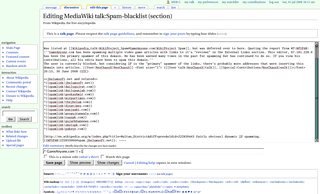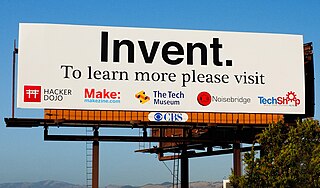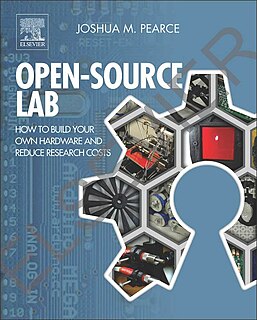Autodesk, Inc. is an American multinational software corporation that makes software products and services for the architecture, engineering, construction, manufacturing, media, education, and entertainment industries. Autodesk is headquartered in San Rafael, California, and features a gallery of its customers' work in its San Francisco building. The company has offices worldwide. Its U.S. locations are California, Oregon, Colorado, Texas, Michigan, New Hampshire and Massachusetts. Its Canada offices are located in Ontario, Quebec, and Alberta.

MetaFilter, known as MeFi to its members, is a general-interest community weblog, founded in 1999 and based in the United States, featuring links to content that users have discovered on the web. Since 2003, it has included the popular question-and-answer subsite Ask MetaFilter. The site has six paid staff members, including the owner, and about 12,000 active members as of early 2011.

Flickr is an American image hosting and video hosting service, as well as an online community. It was created by Ludicorp in 2004 and is a popular way for amateur and professional photographers to host high-resolution photos. It has changed ownership several times and has been owned by SmugMug since April 20, 2018.

EAGLE is a scriptable electronic design automation (EDA) application with schematic capture, printed circuit board (PCB) layout, auto-router and computer-aided manufacturing (CAM) features. EAGLE stands for Easily Applicable Graphical Layout Editor and is developed by CadSoft Computer GmbH. The company was acquired by Autodesk Inc. in 2016.

The RepRap project started in England in 2005 as a University of Bath initiative to develop a low-cost 3D printer that can print most of its own components, but it is now made up of hundreds of collaborators worldwide. RepRap is short for replicatingrapid prototyper.
Make is an American magazine published by Make: Community LLC which focuses on Do It Yourself (DIY) and/or Do It With Others (DIWO) projects involving computers, electronics, metalworking, robotics, woodworking and other disciplines. The magazine is marketed to people who enjoyed making things and features complex projects which can often be completed with cheap materials, including household items. Make is considered "a central organ of the maker movement".

Autodesk Revit is a building information modelling software for architects, landscape architects, structural engineers, mechanical, electrical, and plumbing (MEP) engineers, designers and contractors. The original software was developed by Charles River Software, founded in 1997, renamed Revit Technology Corporation in 2000, and acquired by Autodesk in 2002. The software allows users to design a building and structure and its components in 3D, annotate the model with 2D drafting elements, and access building information from the building model's database. Revit is 4D building information modeling capable with tools to plan and track various stages in the building's lifecycle, from concept to construction and later maintenance and/or demolition.
CE Linux Forum, otherwise known as the Consumer Electronics Linux Forum or CELF, is a non-profit organization that works to advance Linux as an open source platform for consumer electronics (CE) devices. It has a primarily technical focus, working on specifications, implementations, conferences and testing to help Linux developers improve Linux for use in CE products.

Taltopia was an online artistic community which connected aspiring artists with fans and talent industry professionals. It was launched in Los Angeles, California on February 28, 2008 by Allen Vartazarian, a UC Berkeley graduate, and Anthony Zanontian, a UC San Diego graduate.

In computing, a blacklist is a basic access control mechanism that allows through all elements, except those explicitly mentioned. Those items on the list are denied access. The opposite is a whitelist in which only items on the list are let through whatever gate is being used. A greylist contains items that are temporarily blocked until an additional step is performed.
Fotki is a digital photo sharing, video sharing and media social network website and web service suite; it is one of the world's largest social networking sites. In many ways, the site appears to be similar to the majority of other popular photo sites which support a number of so-called Web 2.0 features, such as use of Ajax, tagging, RSS feeds, social bookmarking, GPS location information and Exif info display.
4mations is a website made for people to upload, view and share animated films and games. The site was founded in 2008 by the Channel Four Television Corporation, sponsored by Aardman Animations and Lupus Films. As the site is targeted to adults, risque animations are often featured.

DeviantArt is an American online art community featuring artwork, videography and photography subsidiary of the Israeli company Wix.com. It was launched on August 7, 2000 by Angelo Sotira, Scott Jarkoff, Matthew Stephens, and others. Artworks are organized in a category structure, including photography, digital art, traditional art, literature, Flash, filmmaking, skins for applications, operating system customization utilities and others, along with downloadable resources such as tutorials and stock photography. Additional features include journals, polls, groups, and portfolios.
Course Hero is an American education technology website company based in Redwood City, California, which operates an online learning platform for students to access course-specific study resources contributed by a community of students and educators.
Freelancer is an Australian freelance marketplace website, which allows potential employers to post jobs that freelancers can then bid to complete. Founded in 2009, its headquarters is located in Sydney, Australia, though it also has offices in Vancouver, London, Buenos Aires, Manila, and Jakarta.

The maker culture is a contemporary subculture representing a technology-based extension of DIY culture that intersects with hacker culture and revels in the creation of new devices as well as tinkering with existing ones. The maker culture in general supports open-source hardware. Typical interests enjoyed by the maker culture include engineering-oriented pursuits such as electronics, robotics, 3-D printing, and the use of computer numeric control tools, as well as more traditional activities such as metalworking, woodworking, and, mainly, its predecessor, traditional arts and crafts. The subculture stresses a cut-and-paste approach to standardized hobbyist technologies, and encourages cookbook re-use of designs published on websites and maker-oriented publications. There is a strong focus on using and learning practical skills and applying them to reference designs. There is also growing work on equity and the maker culture.
Squid Labs was an American independent research and development company founded by a group of four MIT graduates. In 2004, Colin Bulthaup, Dan Goldwater, Saul Griffith, and Eric Wilhelm moved from the East Coast to California to found the company known as Squid Labs. During its years of existence from 2004 to 2007, Squid Labs added three more members to its team: Geo Homsy, Corwin Hardham and Ryan McKinley. Working out of a warehouse in Emeryville, the group adopted the slogan "We're not a think tank, we're a do tank." and created a handful of patents and inventions including an electronically sensed rope, portable pull-cord generators, and a machine that could manufacture eyeglasses of any prescriptions at extremely low cost. Squid Labs was also the birthplace for many companies still running today, such as Makani Power and Howtoons. Although the company no longer exists, Squid Lab's co-founder, Saul Griffith created a similar company in San Francisco named Otherlab.
Tango was an augmented reality computing platform, developed and authored by the Advanced Technology and Projects (ATAP), a skunkworks division of Google. It used computer vision to enable mobile devices, such as smartphones and tablets, to detect their position relative to the world around them without using GPS or other external signals. This allowed application developers to create user experiences that include indoor navigation, 3D mapping, physical space measurement, environmental recognition, augmented reality, and windows into a virtual world.

The Open-Source Lab: How to Build Your Own Hardware and Reduce Research Costs by Joshua M. Pearce was published in 2014 by Elsevier.

Twistys is a major adult film studio, producing its eponymous pornography website, Twistys.com, a variety site that caters to many different preferences.












